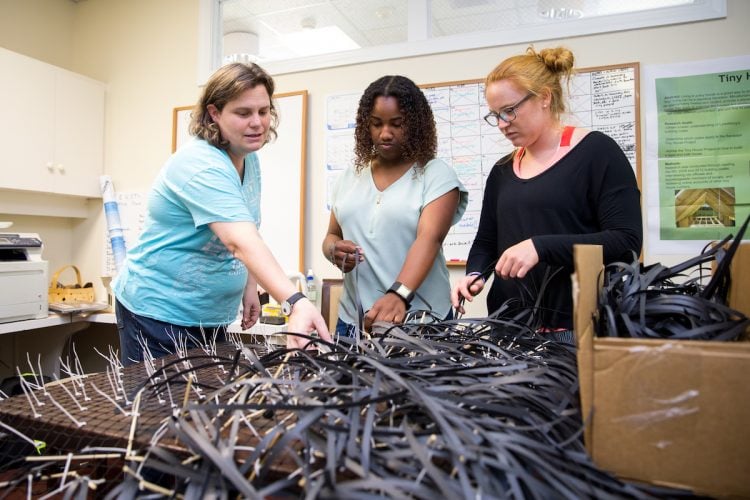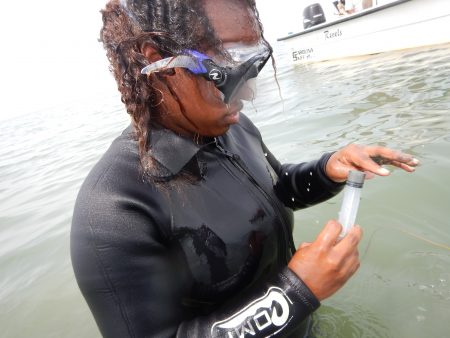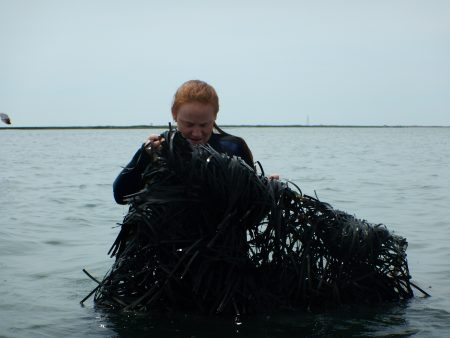Diving into Research

Physics and environmental studies professor Sarah Sojka, Tyrah Cobb-Davis ’19, and Libby Exline ’19 construct artificial seagrass.
Earlier this summer, Tyrah Cobb-Davis ’19 and Libby Exline ’19 looked like they were going on a diving expedition. They packed wetsuits and swimming goggles into a car before loading up the most important item—a large, black mass of intertwined plastic tubes, or artificial seagrass.
For their Summer Research project, the students are working with physics and environmental studies professor Sarah Sojka to build and install the artificial seagrass along Virginia’s southeastern shore. Seagrass is totally submerged vegetation and is known as an ecosystem engineer that provides many benefits to the environment. And although the global population continues to decrease, there has been some success in bringing it back in the Chesapeake Bay area using the fake plants.

Tyrah Cobb-Davis ’19 studies a water sample.
“In the 1930s, there was a hurricane and a wasting disease that left it almost entirely extinct,” Sojka said. “It’s slowly been restored, but there are some areas where it used to live that it won’t grow now. The hope is that if we put in this fake seagrass and sort of mimic its structure, we can actually get real seagrass to grow there around it.”
At Randolph, Cobb-Davis and Exline have been analyzing data from other restoration efforts and constructing more artificial seagrass using polypropylene plastic, which is easy to cut, buoyant, and bends similarly to real plant. In June, they traveled to Cobb Island, where they worked alongside other college students from across the nation to install new artificial seagrass beds and examine the effects of existing ones.
Exline, who is an environmental studies major and grew up near the coast of Maryland, was eager to conduct this kind of research.
“I’ve always been interested in the ocean,” Exline said. “I remember saying when I was little that I wanted to be a marine biologist, then I wanted to be an ocean engineer, and I kept with it. So when Dr. Sojka proposed this project I knew right away that I wanted to do it.”

Libby Exline ’19 examines a seagrass bed off of the Virginia coast.
Cobb-Davis is a physics major who recently discovered a passion for environmental work. “I’ve had an opportunity to participate in some great projects and to take different classes in environmental science, and I just thought this project was a great way to bring both physics and environmental science—both of my interests—together,” she said.
Cobb-Davis added that the project and the environmental classes she has taken have opened her mind to more career possibilities. “Initially when I arrived at Randolph, I was really interested in engineering, but I think physics is a great field that kind of allows me to study a lot of different things,” she said. “If I wanted to study physics but also have a focus on environmental science for my career, I have the opportunity to do that.”
For Exline, Summer Research is a great segway into another environmental project. Two days after the program ends, she will travel to Turks and Caicos island, where she will take part in a field study on coral reefs in the area.
“I’ve always been interested in how the environment influences every aspect of life,” Exline said. “I’m also really intrigued by nutrition and how food grows, and the fishing culture and how it affects not only the ecosystem, but also human health. I thought an environmental studies major would suit me best to continue growing my knowledge. I’m always wanting to learn more.”
Exline said another benefit of Summer Research has been getting to know her fellow Summer Research students even better. “We all live on the same hall and make dinner together, and when you’re stressed out, there’s always someone to talk to or hang out with,” she said. “We never get bored.”
Tags: environmental science, environmental studies, environmental sustainability, Libby Exline, marine science, Sarah Sojka, student faculty research, summer research, Summer Research 2017, Tyrah Davis
